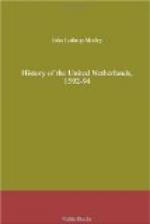“The immediate cause of the ruin of France,” continued the Jesuit, “comes from two roots which must be torn up; the one is the extreme ignorance and scandalous life of the ecclesiastics, the other is the tyranny and the abominable life of the nobility, who with sacrilege and insatiable avarice have entered upon the property of the Church. This nobility is divided into three factions. The first, and not the least, is heretic; the second and the most pernicious is politic or atheist; the third and last is catholic. All these, although they differ in opinion, are the same thing in corruption of life and manners, so that there is no choice among them.” He then proceeded to set forth how entirely, the salvation of France depended on the King of Spain. “Morally speaking,” he said, “it is impossible for any Frenchman to apply the remedy. For this two things are wanting; intense zeal for the honour of God, and power. I ask now what Frenchman: has both these, or either of them. No one certainly that we know. It is the King of Spain who alone in the world has the zeal and the power. No man who knows the insolence and arrogance of the French nature will believe that even if a king should be elected out of France he would be obeyed by the others. The first to oppose him would be Mayenne; even if a king were chosen from his family, unless everything should be given him that he asked; which would be impossible.”
Thus did the wily Priest instil into the ready ears of Philip additional reasons for believing himself the incarnate providence of God. When were priestly flatterers ever wanting to pour this poison into the souls of tyrants? It is in vain for us to ask why it is permitted that so much power for evil should be within the grasp of one wretched human creature, but it is at least always instructive to ponder the career of these crowned conspirators, and sometimes consoling to find its conclusion different from the goal intended. So the Jesuit advised the king not to be throwing away his money upon particular




